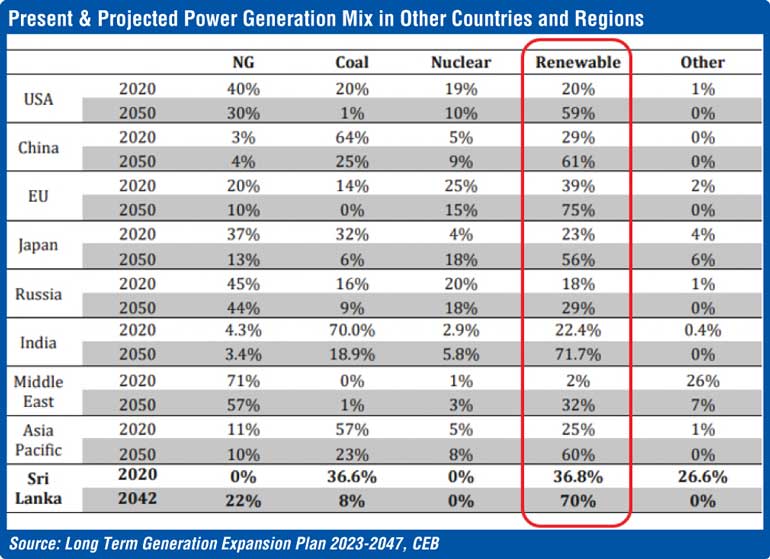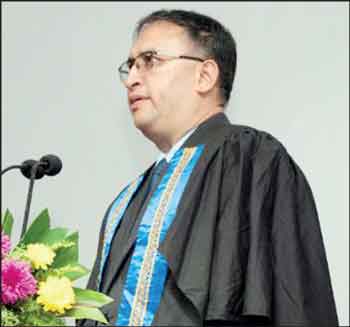Wednesday Feb 18, 2026
Wednesday Feb 18, 2026
Saturday, 22 February 2025 00:00 - - {{hitsCtrl.values.hits}}

 |
| University of Peradeniya Faculty of Engineering Dean Prof. Lilantha Samaranayake |
During the Eng. (Prof.) R.H. Paul Memorial Oration 2025, Prof. Lilantha Samaranayake emphasised the urgent need for advanced solar photovoltaic (PV) integration to create a resilient and sustainable energy future. Speaking on the Future of Renewable Energy, he highlighted projections from the International Energy Agency (IEA) that forecast global renewable electricity generation will exceed 17,000 TWh by 2030, representing an almost 90% increase from 2023. Solar PV is anticipated to become the leading source of renewable electricity, followed by wind and hydroelectric power.
Sri Lanka has set an ambitious target of achieving 100% renewable energy. Policymakers are working towards a people-centric, equitable, and affordable energy transition. The Government also aims to reduce electricity tariffs by 30% within five years, though no specific timeline has been set for net-zero emissions.
Challenges in solar PV integration—While renewable energy adoption is increasing, challenges remain. A major issue is grid stability due to solar energy’s intermittent nature. Grid stability refers to the ability of an electrical power grid to maintain a consistent voltage and frequency while balancing electricity supply and demand. One of the main challenges with integrating solar energy into the grid is its intermittent nature, meaning that solar power generation fluctuates depending on sunlight availability. This variability can cause instability in the grid.
Why is solar energy intermittent? Solar panels generate electricity only when exposed to sunlight. At night, there is no generation, requiring alternative power sources. Cloud cover, rain, and seasonal changes affect solar energy output. On cloudy days, solar generation can drop suddenly, causing fluctuations in power supply. Unlike conventional power plants that provide a steady output, solar energy can vary within minutes, making it challenging to maintain a stable power flow.
How does this affect grid stability? The electricity grids operate at a specific frequency (e.g., 50 Hz or 60 Hz). A sudden drop in solar power generation can lead to a decrease in frequency, potentially causing power outages. Solar energy injections can cause voltage levels to rise or drop unpredictably, affecting equipment performance and consumer supply quality. Traditional power plants have rotating generators that provide inertia, helping to stabilise the grid. Solar PV systems do not have this natural inertia, making the grid more susceptible to instability.
Prof. Samaranayake explained that Sri Lanka’s current power generation mix, as of November 2024, includes:
A key concern is the lack of inertia in renewable energy sources. Unlike conventional power plants, solar and wind do not provide inherent grid stability, leading to frequency fluctuations.
Prof. Samaranayake proposed an innovative solution for grid stability: implementing Virtual Inertia using advanced power electronic control systems. This approach mimics the stabilising effect of traditional rotating generators, ensuring a steady frequency supply in the grid.
Other potential solutions include:
The introduction of advanced Virtual Inertia technology is expected to complement regulatory changes that relax statutory voltage limits and improve the quality of electricity supply.
Another controversial yet forward-looking strategy discussed was the possibility of nuclear energy. According to sources from the Sri Lanka Atomic Energy Board (SLAEB), the country’s first nuclear power plant, leveraging integral pressurised water reactor (iPWR) technology, could be operational by 2032. Given Sri Lanka’s proximity to India, which already operates nuclear plants, proponents argue that nuclear energy could be a viable option for stabilising the power grid.
Prof. Samaranayake stressed the need for a holistic approach, as solar PV continues to be vital to Sri Lanka’s energy future. This involves investing in energy storage, enhancing grid infrastructure, and enacting regulatory reforms. He called on policymakers, engineers, and the public to collaborate in creating a more sustainable and resilient energy landscape.
The Eng. (Prof.) R.H. Paul Memorial Oration reminds us of engineering and innovation’s critical role in tackling global energy challenges. With strategic planning and technological advancements, Sri Lanka can pave the way for a cleaner, more sustainable future.
The oration paid tribute to the late Prof. R.H. Paul, a distinguished academic and former Dean of the Faculty of Engineering, University of Peradeniya, who made significant contributions to electrical and electronic engineering in Sri Lanka. His legacy continues to inspire advancements in the energy sector.